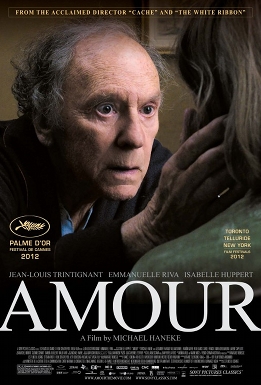Unconditional love stands front and center in the truly original and thought-provoking Amour from acclaimed Austrian filmmaker Michael Haneke. But for all that the film does right, it equally falters, most notably thanks to uneven pacing that ultimately wears down its audience as they attempt to stay involved in the truly heart-wrenching life of the film's leading two players.
Much of the film is quiet as Haneke allows the actor's actions and movements to do most of the talking. The strategy pays off early as we grow accustomed to the lifestyle of our leading two; however, as the story wanes on and Anne's attack begins to really affect their normal routine, the quietness wears a bit thin as your mind easily wanders away from the events taking place on screen.
That isn't to say that the film doesn't have its moments; it most definitely does. But the sappiness begins to lose its effect as Anne's downfall fills you with frustration and aggression. The end result is effective for the point of the story, but it ultimately results in an unpleasant last hour as Anne's husband contemplates his selfish love and the true quality of life.
An extremely small cast helps to keep the story in check, and Emmanuelle Riva gives one of the year's most extraordinary performances as Anne, a healthy woman who, after an attack, quickly begins to lose control of her body. Her demise puts her husband in a tight spot as their love for one another is tested, forcing them to enter into the most challenging time of their life.
The film is a major character study as the concept of true love is divulged throughout. But Amour is painfully slow and quite a bit anticlimactic. The true build-up comes and goes without much attention, proving that, in the case of this film, the individual performances far outweigh the overall power of the story. It was a deep and meaningful concept, but a lack of execution leaves much to be desired on nearly all fronts.

